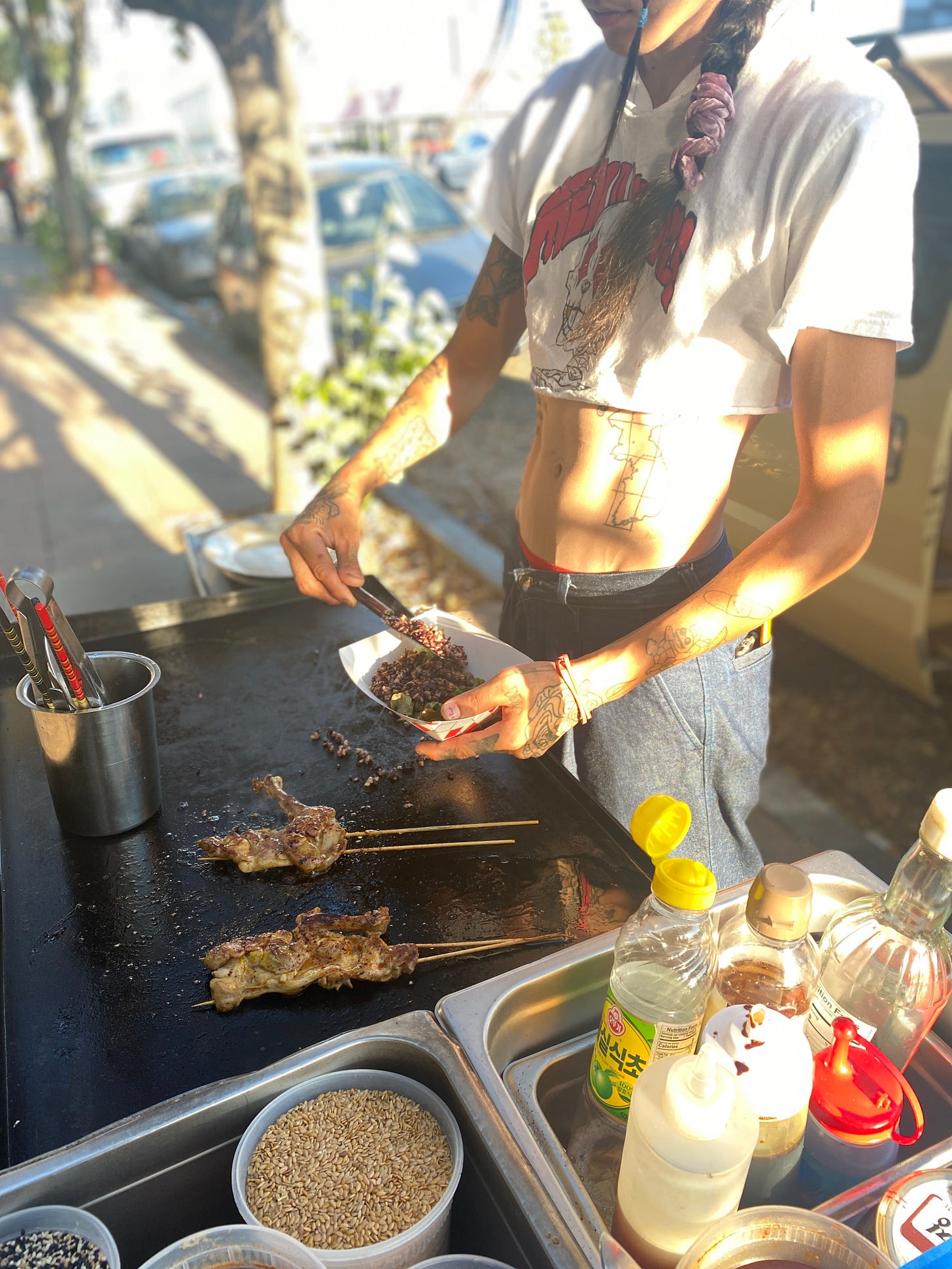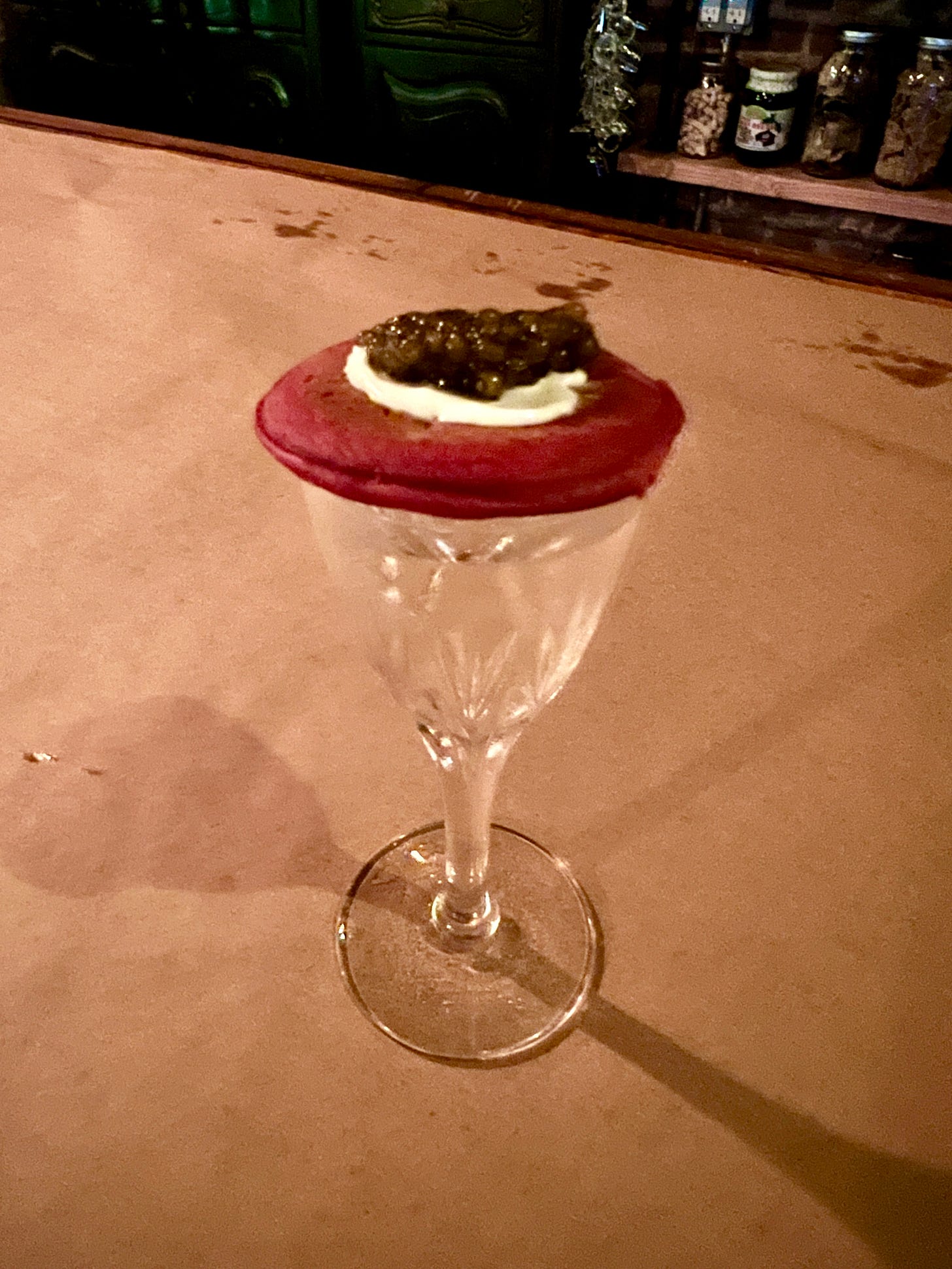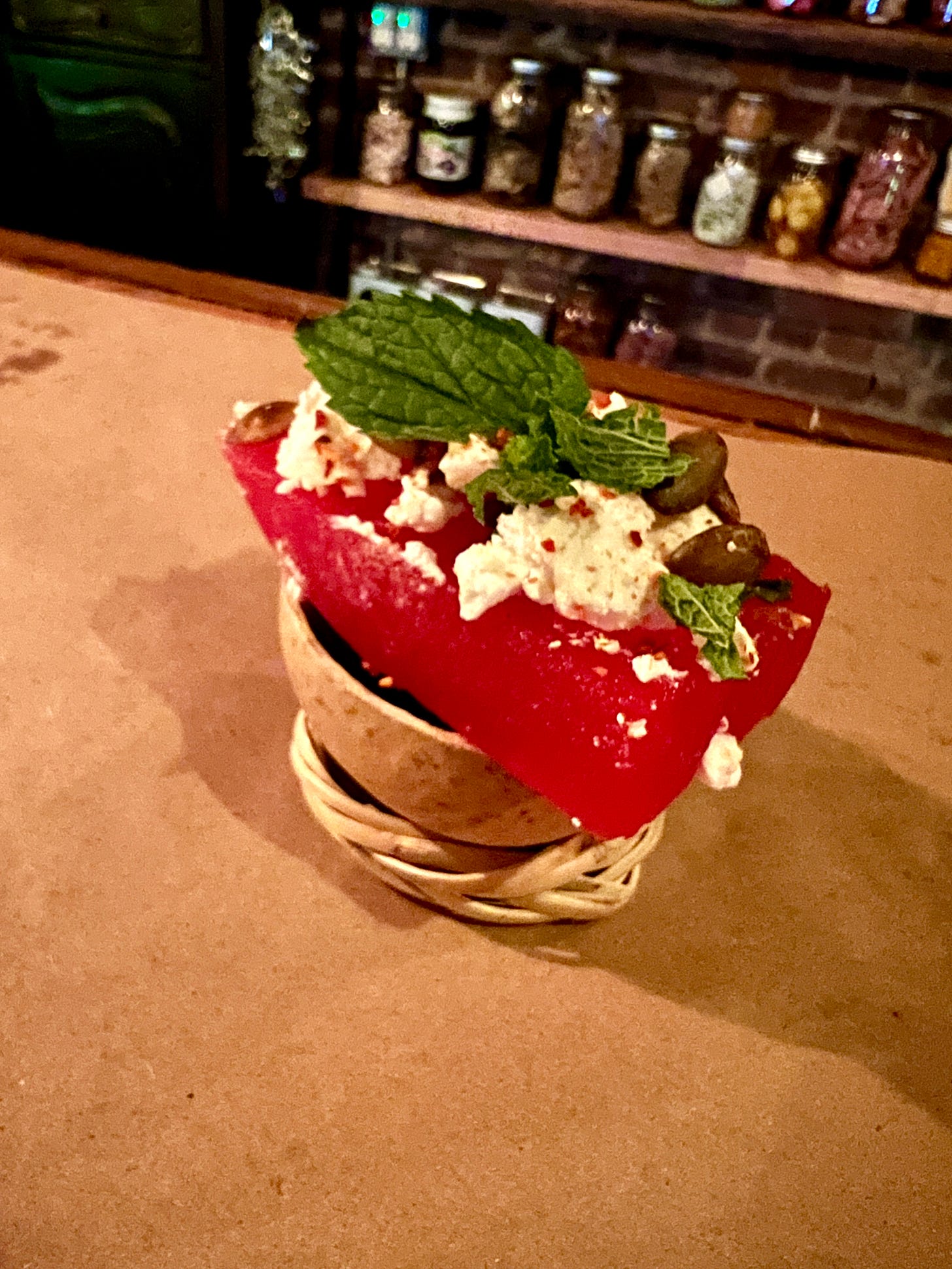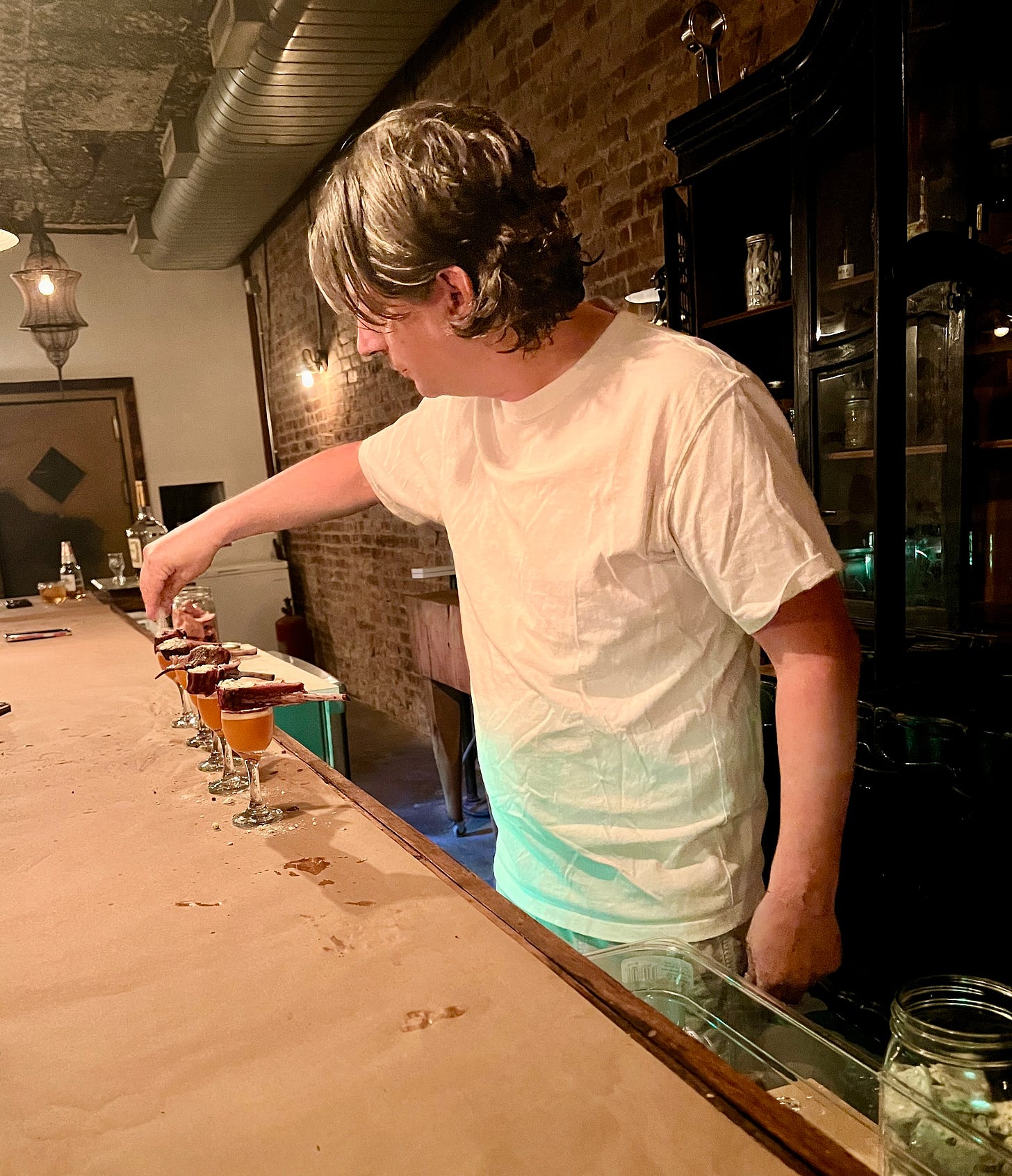I met Kelso at Genever, the gin bar she ran in Filipinotown. You could easily miss the bar from the outside, a single inconspicuous sign marking its entrance. Inside, however, was a stark contrast to the minimalistic standards most LA bars seem beholden to. Feminism oozed from every detail: plush velvet banquettes lined the walls and warm lighting hung from the ceiling, reflected in gold framed mirrors. I’d walked inside to ask Kelso for a bucket of water for Evan, who was setting up his pop-up just outside on the sidewalk. Walking into the bar and seeing her behind it, I recognized and immediately admired the air of authority I’ve only seen in women in the food and beverage industry. She tended to the eager customers waiting for their drinks, and delegated tasks to the rest of the staff and, without making me feel like I was intruding, asked what I needed with a smile. I didn’t know then why I felt so at ease around her immediately, but in retrospect, I think it likely had something to do with the significance of the day.
It was a day the United States’ stance on women and their autonomy couldn’t have been more clear. I’d remember so clearly standing outside my apartment when I first saw the news that after nearly half a century of abortion access protected by the constitution, Roe v. Wade had been overturned. Throughout my teenage years and young adult life, I had the great privilege of never having to make tough decisions about my body, but should I need to, it wouldn’t have been an issue. Suddenly, I viewed my body in a much different way. There was a responsibility for actions outside of many women’s control that now rested in the very core of a their body. I woke up Evan, tears in my eyes for generations younger than me in the middle of the country who would grow up thinking choices about their bodies weren’t their own to make. “What happened?” he asked, sitting up with a jolt. When I told him, his concern immediately turned to anger. I’d always known Evan was staunchly feminist (I wouldn’t have married him if he weren’t), but I couldn’t have imagined the way he sprung to action.
He decided his pop-up that night at Genever would be a fundraiser for the Women’s Reproductive Rights Assistance Program. He made more money than he ever had with his pop-up and Kelso matched every dollar. The night wouldn’t have been such a success, or even possible, had she not had a hand in organizing. Seeing a woman take charge of her own anger about what was going on in the country, I felt inspired. It’s easy to feel like an insignificant cog in a machine moving without your consent when decisions are made by men about what a woman can and can’t do. Kelso showed me that night that by doing what we know how to do which, in her case, was taking care of people in the form of hospitality, we do have power where it seems like we don’t.
Philosopher Jacques Derrida wrote, among other things, about friendship. He claimed that the intimacy of friendship lies in recognizing yourself in the eyes of another. I’d subconsciously recognized myself in Kelso that night behind the bar; I too was working in a male-dominated industry and navigating it with the grace that society expects women to have. The next time I saw Kelso was at Evan’s celebration of life. She came alone a few hours after the party had started. When I greeted her, her eyes immediately welled up behind her glasses. I don’t quite remember what we talked about, but I do remember thinking how beautiful it was that she was able to share this grief with me. I hadn’t been able to cry as much as I would have liked that day; I felt a great responsibility to be the consummate host. Talking to Kelso, I saw what I’d been unable to feel, steeling myself through the day so that I could speak to everyone who showed up for Evan. I recognized myself in her tears. I was learning more deeply about the identity of mine that was born when Evan died.
Before speaking on friendship, Derrida was already well-known and more or less synonymous with the idea of deconstruction. Opposites, he claimed, were mutually constitutive; the understanding of an idea or a state of being is influenced by its opposite. My understanding of loneliness in the months after Evan died came from my understanding of what it was to be partnered. Those months were lonely and dark. I don’t fully remember a lot of them and there weren’t too many people who stuck around to tell me what happened. My great yearning for Evan involved all the things I knew of life with him, which included sitting at a table with what most might consider to be too much food and drink. I missed the feeling of being surrounded by people that were excited about food, and I missed the people that made that exciting food.
I’d sworn off any job in the restaurant industry since my only stint in college, where I worked at a campus gyro shop only for tips (yes, super not legal). After a few incidents of the back of house staff telling me through an open kitchen window to tell the customer who had sent back their food to fuck off, resulting in no tip and an icy interaction, I figured I didn’t have the mental fortitude for the job. After meeting Evan, however, I fell in love with the people in this industry. They know how to take care of people and Kelso, upon first meeting her and ever since, is the embodiment of this quality. She’d asked me to hang out a few times in the months after Evan died, but it never worked out, usually because of the gravitational pull my apartment had on me in the depths of my grief. I’ve never been great at letting people in. More than a few times, I’ve heard the refrain I thought you hated me when I met you, which comes from my inability to be at ease in a social situation (Evan very kindly described me as being “cat-like”).
With Kelso, however, there was something different. I felt comfortable with people who knew Evan as a friend and I felt at home with people who knew Evan in his work. In 1999, Anthony Bourdain wrote in The New Yorker, “Most of us who live and operate in the culinary underworld are in some fundamental way dysfunctional.” In that dysfunction, however, those people find function. They find community. They find purpose. They find each other and themselves. Evan and Kelso met in this very culinary underworld, so even though I didn’t know all that much about her, there was a part of her I knew because I knew that part in Evan. She embraced him wholeheartedly and saw in him what people outside his line of work did not. When we finally did get around to seeing each other, it only felt right to meet for a happy hour where, unable to decide between a few options on the menu, we ordered them all. Drinking and eating with her was coming back to a part of myself I’d forgotten existed.
We continued to get together for food and drinks in the months following. When I told her I had been trying to get a reservation at Donna’s, an Echo Park hot spot, she made it happen because she knew the bar manager. We ate Taiwanese food at Pine and Crane. Then, before I left for New York, she came by so I could gift her some of Evan’s cooking supplies. When she showed up with a bottle of wine and a bag of chips, I could have cried. I’d made a friend in the most unlikely circumstance. Evan will always be the bond that tied us together in the beginning, but we’ve since created our own. She’s unwittingly taught me about being a grown up, a woman, a professional, and a friend, simply by allowing all that I am into our friendship. She’d allowed me to be seen and see.
Since I’ve been back in New York, I’ve felt a similar longing for restaurants, restaurant people, and that indescribable feeling I get around a table full of delicious food, so when Kelso told me she was coming to New York for a work trip and asked if I wanted to join her for a dinner, I couldn’t have been more excited. The great irony is that she asked me to join her for a dinner at F&Bar, a concept that centers around pairings. Small bites are paired with cocktails—the recognition of a flavor note in a cocktail bringing out something in the food it wouldn’t otherwise. Its home is Los Angeles but the owner, a friend of Kelso’s, found a space to launch the concept in New York.
Walking into the space and throughout the night, I felt similarly to the way I felt at Kelso’s bar in Los Angeles. When you’ve spent your life with a person who works in the food world, there are certain qualities in others you begin to admire that you seldom see in other industries. One of these qualities is extreme attention to detail, both in food and in interaction. Kelso, having a great understanding of each course throughout the 14-course experience, mentioned certain ways she preferred to consume the course—like pouring a small bit of a cocktail onto the bite after the first sip. She anticipated what would come next and asked the owner for certain dishes she thought I might like, including a s’more course (I’ll never ever say no to a s’more). Just like the food was influenced by the cocktail it was paired with, my experience with the night was influenced by the company.
In his book Stay True, Hua Hsu says that friendship “rests on the presumption of reciprocity, of drifting in and out of one another’s lives, with occasion moments of wild intensity.” What we learn from others, we give in return, which shapes our own self-narrative. Throughout the past year, I’ve learned more about friendship, and thus about myself, than I have in any other year of my life. I’d never had to make friends as an adult and I never thought I was very good at it. What I learned through Kelso, however, is that friendship is about looking not for another person as much as it is looking for yourself, which we’re all already doing anyway. Where we find ourselves—the places that feel like home to us—we will find friends. She reminds me that I can still have those parts of myself that I thought I lost.








